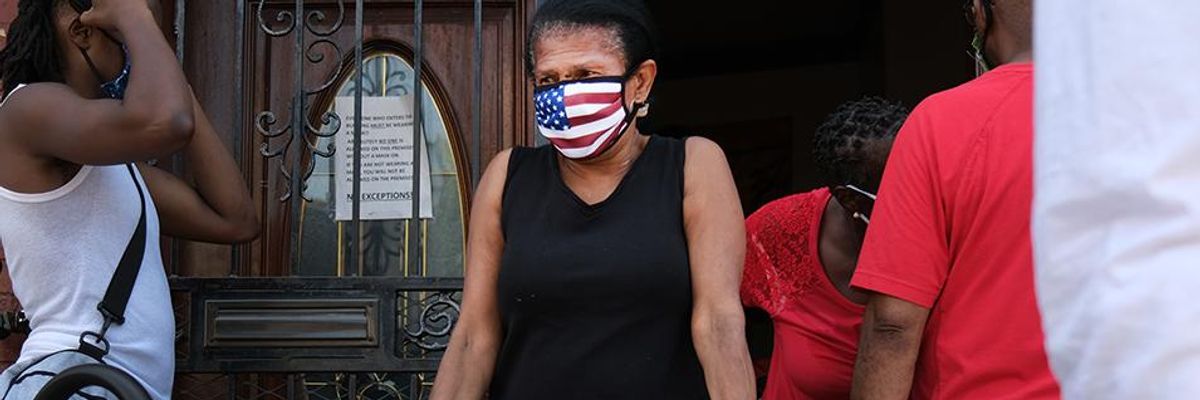As millions of Americans continue to struggle through the Covid-19 pandemic, a coalition of advocacy groups and high net-worth individuals renewed its call for Congress to pass an Emergency Charity Stimulus bill aimed at releasing nearly $200 billion by updating regulations for charitable foundations and donor-advised funds.
"I've been appalled for years by how many foundations treat the 5% federal floor as a ceiling and refuse to spend a penny more than they are required to," Scott Wallace, co-chair of the Wallace Global Fund, which committed to give away 20% of its $120 million endowment this year, said in a statement Wednesday.
"The wealthy donors who created these foundations and donor-advised funds have already reaped vast taxpayer subsidies for their future generosity. In this moment of crisis, only Congress has the power to compel a massive injection of wealthy people's money into jobs and nonprofit charitable organizations vital for our recovery. It's time we sped up that generosity by making foundations pay more right now," Wallace said.
The coalition, which includes the Wallace Global Fund, the Institute for Policy Studies, and Patriotic Millionaires, argues current laws governing the release of certain funds could be altered to mandate a temporary release of money currently sitting in foundation bank accounts, which could help overwhelmed nonprofits not only survive the pandemic, but also serve the people their respective missions set out to help.
"One of the beauties of philanthropy is that different foundations invest in widely different nonprofits," Mary Mountcastle, trustee for the Mary Reynolds Babcock Foundation, said in a statement Wednesday. "By increasing foundation payout, philanthropies will be making more grants across a wide array of causes. We'll be keeping nonprofit workers employed, and we'll also be increasing funding across diverse areas like arts and culture, social justice, and direct services."
In a letter to congressional leaders in May, the coalition wrote:
The independent nonprofit sector employs over 12 million people, ten percent of the private sector workforce. Increased funding could be immediately absorbed by food banks, health care providers, educational institutions, and organizations addressing issues like poverty alleviation, economic development, safe and secure voting, and social justice. Otherwise, foundations which are losing assets on Wall Street will cut their grant-making correspondingly--as they did in the years after the 2009 recession--forcing many nonprofit organizations they fund to reduce budgets, lay off staff, and cut back on their charitable work. This will cause additional problems for an economy which is already in trouble.
In the midst of global pandemic and economic shutdown, there is no justification for allowing the country's wealthiest dynasties to continue to hoard tax-advantaged funds that have already been designated as charitable contributions in anticipation of some future need, when there are so many urgent needs now. While this change is a deviation from the status quo, it is a modest one. Congress' purpose in incentivizing these foundations and funds with tax deductions in the first place was to support charitable efforts. There has clearly not been a moment in the past 50 years in which the full deployment of our charitable sector was more necessary.
America is in an unprecedented crisis. The world of philanthropy must step up and do more, faster. Congress must insist on it.
The renewed call comes as polling shows the number of unemployed Americans who struggle to meet basic needs has nearly doubled since the federal $600 unemployment benefit was allowed to expire by the Republican-led Senate, and that nearly half of Americans believe an unexpected health emergency could bankrupt them. Meanwhile, the billionaire class has seen its wealth increase by hundreds of millions during the pandemic, and Amazon CEO Jeff Bezos became the world's first person whose net worth surpassed $200 billion.
"In the face of the pandemic, an immediate next step would be for federal lawmakers to institute an Emergency Charity Stimulus to mandate higher foundation payouts for the next three years," Chuck Collins and Helen Flannery of of the Institute for Policy Studies wrote in an op-ed for Inside Sources last month. "A 10% minimum payout for foundations and DAFs, we find, could move $200 billion off the sidelines to address the Covid-19 crisis, without costing taxpayers another dime."
